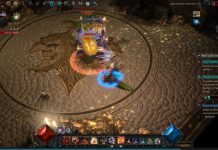As EVE Online is a pay-to-play game, it’s unlikely that I would cover it being that we lean towards the free-to-play market. However, EVE has some interesting elements that align it a little bit with the free-to-play models that we all know any love. The game presents an interesting sociological model of a coherent, single-shard universe in which everything in game is produced by players. The ships, weapons, items, and even space stations are all built from the ground up by players who mine the raw materials, craft the underlying components, and fuel both the industry and markets that produce them.
Eve Online is from top-to-bottom a player driven MMO.
In 2009, CCP Games, the Icelandic developer and publisher of Eve Online introduced the PLEX—or Pilot License Extension—which were essentially an in-game item purchasable for real-world cash that provided a month worth of subscription extension. Since the PLEX was an in-game item, it could be traded between players and sold on the market. As a result, the in-game currency ISK could be generated via purchasing a PLEX and selling it on the market. The items began to gain in-game value and in fact players who spent enough time to have a particularly high ISK income could forgo a subscription and instead purchase PLEX in order to keep playing.
This means that for certain players, EVE essentially became a free-to-play game.
Recently, CCP started looking into adding a microtransactions transaction system in order to support a cash shop. Initially this was sold to players as part of a change to their game that would give players actual avatars. For all the years since its inception, EVE has been all about spaceships—unlike the standard MMO, players where “pilots” in concept only and the only thing people really saw of each other were spaceships. CCP pushed for a content expansion called “Incarna,” a word which mimics incarnate or “in the flesh”; in June they announced an upcoming feature called Captain’s Quarters, which would introduce actual walk-around avatars for players.
With avatars that could walk around the game world, CCP realized that they could outfit these characters, accessories, garments, and all manner of customization as seen in other games. With dollar-signs in their eyes they argued the merits and pitfalls of a cash-shop system openly in front of players and mentioned an entirely new microtransaction currency that would be connected to real-world money designed for the purchase of these items.
Needless to say, the culture of EVE did not take this sitting down. The introduction of items that couldn’t be crafted by players wouldn’t be stomached by a community who poured time, sweat, and tears into everything in the game (another thing which makes being blown up in the game a disincentive to enter combat.) However, just the introduction of these items—clothing for avatars—couldn’t account for the truly violent reaction of players.
Ars Technica ran an article about the $60 monocle that has become the masthead for all the fears of the EVE Online population who saw the intrusion of microtransactions into their community as presenting the possibility of so-called “gold ammo” or “gold spaceships.” To wit, game items that would change gameplay that could only be purchased with real-world microtransactions. This fear actually rose out of documents leaked from CCP where they argued amidst themselves the pros and cons of such a system.
These fears triggered an in-game riot/protest, as described in the Ars article, involving a number of players flying into Concord space and attacking an invulnerable monument there. They designed this action as a sort of cyber sit-in that would generate so much server traffic at that point as to slow down and lag the area so much as to make it unstable to all players. And, since EVE is a single-shard persistent universe, it could potentially affect all players who wanted to access that region.
As to what CCP really intended, however, reading a recent interview on MMORPG.com with EVE Online Lead Designer Kristoffer Touborg painted a picture of misunderstanding and miscommunication from CCP staff to their player base.
“I would have loved to just copy paste ‘GOLD AMMMO GETS INTO EVE WHEN IT’S TAKEN FROM MY COLD, DEAD HANDS’ everywhere,” Touborg is quoted saying. “That’s not to say that gold ammo is universally awful, I just don’t think it fits into our particular universe.”
While this may mollify some of the discontent, it doesn’t cover all of the criticisms fans of the game have of the new content patch, Incarna, and the potential microtransaction system in general. Many pilots on EVE has expressed discontent at CCP enlarging the sphere of the moneymaking schemes of the game while appearing to ignore numerous bugs and flaws in the gameplay itself. Many criticize CCP for developing Incarna, avatars, and a microtransacton system while ignoring critical issues.
Needless to say, whatever direction CCP chooses to go, they hold a monopoly on the type of game EVE Online is.
In the MMO ecology there are no other games that fill its niche. EVE Online is a persistent, single-universe science fiction space military game with an entirely player-run economy. While current players certainly might call out in protest and potentially desire to ditch their accounts in order to call attention to their complaints they have nowhere else to go for the same or even similar experience.
While the agitation in the player base seems to have simmered down for a while, we’re probably not going to see the end to turmoil as Incarna rolls out and microtransactions roll in.



















